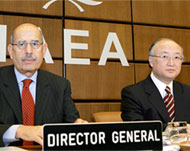Iran refuses freeze on nuclear work
Iran’s senior nuclear negotiator has said his country will not suspend uranium enrichment, in a clear rejection of a UN resolution calling for a freeze of the sensitive nuclear work.

In the first formal reaction to the July 31 resolution, Ali Larijani said on Sunday: “Our activities respect the Non-Proliferation Treaty … so we will not accept the suspension [of uranium enrichment].
“They should know that such resolutions will not affect our determination. We will pursue the nuclear rights of Iranians which are enshrined in the NPT,” he told a news conference.
The UN security council resolution requires Iran to halt uranium enrichment and other sensitive nuclear fuel work by August 31 or face the prospect of sanctions.
Larijani said the resolution had no legal credibility and negated the purpose of the International Atomic Energy Agency.
The resolution was pushed through after Iran ignored a previous non-binding deadline and did not respond to the offer of a package of incentives in exchange for a moratorium on nuclear fuel work.
Package offer
Iran, a member of Opec, insists it wants to enrich uranium only to make reactor fuel for power stations, but there are widespread suspicions the country wants the capacity to make weapons-grade uranium.
Larijani also said that Iran could expand its nuclear activities by increasing the cascade of centrifuges used for uranium enrichment.
However, he said Iran was still studying the package of incentives, offered by Britain, China, France, Germany, Russia and the United States and handed to Tehran on June 6, saying it “had the potential to resolve the nuclear issues”.
The package offers trade, technology, diplomatic and other incentives as well as multilateral talks – also involving the United States – if Iran agrees to freeze enrichment.
“It has positive points as well as ambiguities. Negotiations must be constructive and away from pressure, to enable the ambiguities to be be removed,” Larijani said.
Warning of retort
 |
|
The IAEA routinely inspects |
Larijani also said any countries that impose sanctions on Iran will get an unpleasant response from the world’s fourth biggest oil exporter.
“If they do, we will react in a way that would be painful for them,” he said when asked about what would happen if the UN security council passed sanctions.
“They should not think that they can hurt us and that we would stand still without reaction,” he said.
In February, Iran for the first time produced a batch of low-grade uranium, using a cascade of 164 centrifuges.
The process of enrichment can be used to generate electricity or to create an atomic weapon, depending on the level.
The IAEA regularly inspects Iran’s nuclear facilities and has said there was no evidence proving that Iran’s nuclear programme has diverted towards weapons.